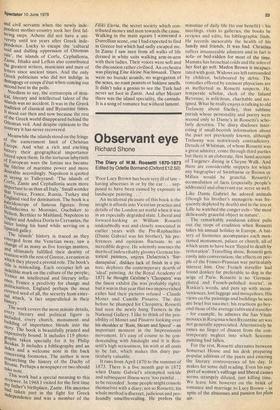Observant eye
Richard Shone
The Diary of W.M. Rossetti 1870-1873 Edited by Odette Bomand (Oxford £12.50) 'Poor Lucy Brown has been very ill of late — having abscesses in or by the ear . supposed to have been caused by exposure in landscape painting . . An incidental pleasure of this book is the insight it affords into Victorian practice and details of the London art world when it was in an especially degraded state. Liberal and forward-looking as William Rossetti undoubtedly was and closely associated in earlier years with the Pre-Raphaelites (Dante Gabriel was his brother), his preferences and opinions fluctuate to an incredible degree. He solemnly assesses the merits of indescribably gloomy German historical painters, enjoys Delacroix's `Surdanapalus', dislikes lack of finish in a picture, deplores the contemporary dearth of `ideal' painting. At the Royal Academy of 1871 he thought Gerome's 'Cleopatra' was the finest exhibit (he was probably right); but it was in that year that two impoverished exiles had their pictures refused — Claude Monet and Camille Pissarro. The day before he plumped for Cleopatra, Rossetti had seen the newly hung Turners in the National Gallery. I like to think of the possibility of Monet and Pissarro looking over his shoulder at 'Rain, Steam and Speed' — an important moment in the Impressionist movement. It's easy of course to be condescending with hindsight and it is Rossetti's high seriousness, his wish at all costs to be fair, which makes this diary particularly valuable. It runs from April 1870 to the summer of 1873. There is a five month gap in 1872 when Dante Gabriel's attempted suicide and subsequent illness were 'too painful. pe. . pe. . to be recorded'. Some people might console themselves with a diary; not so Rossetti; his whole method is discreet, judicious and profoundly unselfrevealing• He prefers the minutiae of daily life (to our benefit) — his meetings, visits to galleries, the books he reviews and edits, his bibliographic finds. He records inexorably the health of his family and friends. It was bad. Christina suffers innumerable ailments and in fact is sofaor bed-ridden for most of the time. Mammahas bronchial colds and the soles of her feet go soft. Madox Brown is incapacitated with gout. Widows are left surrounded by children, belaboured by debts. The remedies offered by eminent physicians are as ineffectual as Rossetti suspects. He, temperate scholar, clerk of the Inland Revenue, is solicitous, charitable and resigned. What he really enjoys is talking to old Trelawny about Shelley, that sublime pariah whose personality and poetry were second only to Dante's in Rossetti's scholarly devotion. The diary discloses interesting if small-becrish information about the poet not previously known, although Trelawny was notoriously contradictory. Details of Whitman, of whom Rossetti was a great admirer, come through third parties but there is an elaborate, first hand account of Turgenev dining in Cheyne Walk. And there are considerable snippets for which any biographer of Swinburne or Brown or Millais would be grateful. Rossetti's accumulation of facts (especially people's addresses) and observant eye serve us well. Like Dante Gabriel he adored animals (though his brother's menagerie was frequently depleted by death) and in the zoo at Lille he watched the conger eels — 'the most deliciously graceful object in nature'. The remarkably assiduous editor pulls out the stops of erudition when Rossetti takes his annual holiday in Europe. A battery of footnotes accompanies each mentioned monument, palace or church, all of which seem to have been 'flayed to death by restoration'. Travelling alone, Rossetti gets easily into conversation; the effects on people of the Franco-Prussian war particularly interest him. One French traveller had found donkey far preferable to dog in the seige of Paris. Rossetti is no 'Germanplated and French-polished tourist', in Ruskin's words, and puts up with inconveniences, lost luggage and mosquitoes. His views on the paintings and buildings he sees are brief but succinct; his reactions go bey.ond those of the average cultivated traveller — for example, he admires the San Vitale mosaics in Ravenna when Byzantine art was not generally appreciated. Alternatively he raises no finger of dissent from the contemporary neglect into which Seicento painting had fallen. For therest, Rossetti alternates between Somerset House and his desk preparing popular editions of the poets and entering the literary controversies of his day. It makes for some dull reading. Even his support of women's suffrage and liberal causes seems strangely diluted, just killing time. We leave him however on the brink of romance and marriage to Lucy Brown — in spite of the abscesses and passion for plein air.


































 Previous page
Previous page